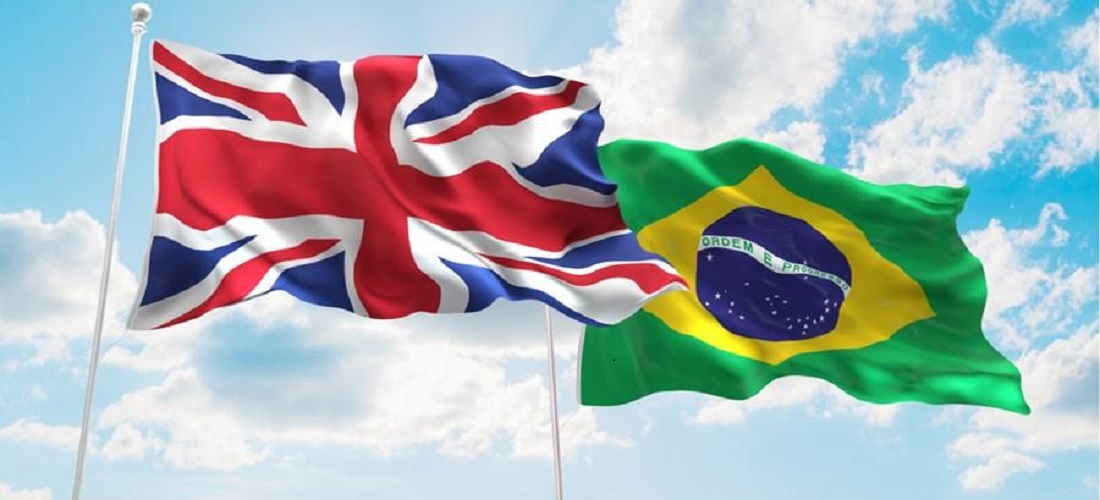
Brazil resists Expanded Trade Partnership proposal by the UK
Feb, 10, 2022 Posted by Gabriel MalheirosWeek 202206
The United Kingdom proposed an Expanded Trade Partnership (ETP) to Brazil. However, the Ministry of Foreign Affairs and the Ministry of Economy found the terms disappointing and resisted taking the negotiations forward. The Bolsonaro administration claims that the offer was unbalanced and only contemplated the interests of London, completely ignoring Brazil’s demand to increase exports to the UK.
Brazil was eager to begin free trade agreement negotiations, according to diplomatic sources. Still, the United Kingdom objected for a variety of reasons, including a supposed lack of technical capabilities to rebuild a network of post-Brexit trade agreements, as well as uncertainty about Mercosur’s fate.
For example, this year marks the 40th anniversary of the Falklands War, a contentious issue in Argentine politics. In addition, the presidential elections in Brazil have fueled concerns about the future of the customs union.
On the other hand, the British stated their desire for an Expanded Commercial Partnership to negotiate “low-hanging fruits.” London had previously envisioned announcing the negotiations on January 31st.
However, disagreements over Brazil – UK ETP’s range made it impossible. Brazil’s Ministry of Foreign Affairs, the Itamaraty, found the British proposal unacceptable. The economic team also criticized the proposal, but it is still trying to bridge some gaps to make it viable.
In addition to simplifying customs procedures, which would be beneficial to both sides, other points suggested by the UK were: greater access to financial services and higher education; government procurement (including in public tenders); “life sciences,” a little-used term that refers to medicines and patents related to them.
The main complaint of the Brazilian government is London’s refusal to include sanitary and phytosanitary measures on the table of discussions. The United Kingdom imports roughly 70% of the food it consumes. About half of that comes from its former European Union partners.
Even with Brexit, these countries continue to have a zero rate to export to the British market. However, many producers in the EU have become so unaccustomed to customs procedures that they prefer not to deal with foreign trade bureaucracy, prompting them to stop exporting.
Brazilian producers have thus seen it as an opportunity to increase their share of participation in the British market. Brazil already sells beef, fruits, nuts, juices, and roasted coffee to the UK. However, producers face restrictive quotas to export chicken meat to the UK, and there is no access to pork, fish, or dairy products.
What troubles the Brazilian government the most are the beef trade barriers. The British inherited EU rules, which Brasilia deemed reasonable, given the complexity of designing a new trade regiment. Notwithstanding, now that years have passed since Brexit, the Itamaraty and the Ministry of Economy argue that the United Kingdom should abandon old rules and embrace modern sanitary measures.
Another complaint has to do with “pre-listing,” a system whereby a meatpacker receives immediate approval to export without the need for separate prior inspections. The EU had a pre-listing with Brazil, but it was suspended in 2017 due to Operation Carne Fraca.
Even though Europe kept the ban, the United Kingdom no longer has an obligation to follow this decision. Brazilians are also protesting that the UK scrutinizes all meat batches that arrive in the country on a sample-by-sample basis.
See below the track record of Brazilian beef exports to the United Kingdom in the last two years. The data is from DataLiner.
Brazil – UK beef exports (HS 0201 and 0202) | Jan to Dec 2020 – 2021 | TEU
Source: DataLiner (click here to request a demo
According to authorities in Brasilia, if an unbalanced ETP that only prioritizes British concerns is approved, the UK would have no reason to negotiate a Free Trade Agreement in the future. There have also been complaints that, despite refusing to discuss agriculture with Brazil, London has signed a treaty with Australia and New Zealand, two major food producers, that addresses these concerns.
On the other hand, the British maintain that they cannot negotiate sanitary and phytosanitary measures because an independent agency regulates them. They also mentioned the case of India, which had an ETP-type partnership with the United Kingdom and then began to negotiate free trade.
“There is enough room to move forward in the coming months, and Brazil should not see this as a zero-sum game. It’s just a start,” says a British informant.
Source: Valor Econômico
To read the full original article, please click on the link:
https://valor.globo.com/brasil/noticia/2022/02/10/brasil-resiste-a-parceria-com-reino-unido.ghtml
-
Ports and Terminals
Jun, 13, 2024
0
Hearing slated to discuss Ecoporto terminal lease contract postponed
-
Blog News (ENG)
Mar, 17, 2023
0
Chile opens borders for papaya imports from Brazil
-
Ports and Terminals
Oct, 08, 2024
0
Amazon-based port in Manacapuru collapses amid construction work
-
Coffee
May, 31, 2024
0
In two years, Brazil may have more robusta coffee supply than Vietnam

